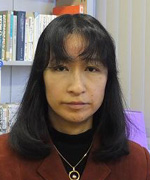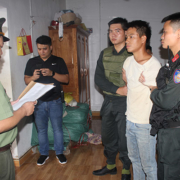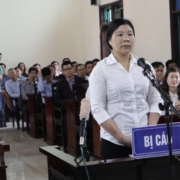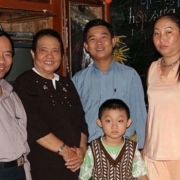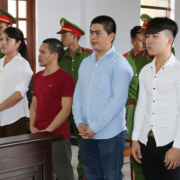Debate suppressed in Vietnam, questions on Japanese cooperation
“In the more than 20 years during which I have observed this country, the Vietnamese government’s predisposition to try and cover up inconvenient truths is fundamentally unchanged. The construction of the nuclear power plants, wrapped in a political climate with inadequate disclosure of information and the suppression of free speech, is already plagued with serious problems before they can even produce technological or economic results” (Ari Nakano, Professor at Daito Bunka University).
—
Debate suppressed in Vietnam, questions on Japanese cooperation
Ari Nakano, June 25, 2013 – This year marks the 40th anniversary of diplomatic relations between Japan and Vietnam. When Prime Minister Shinzo Abe visited Vietnam in January, the two countries confirmed that their relationship had grown into an even greater “strategic partnership” and agreed to continue cooperating on constructing nuclear power plants and developing rare earths resources.
However, many problems have surfaced concerning recent resources and energy development in Vietnam. Simply looking at the progress thus far, there is major cause for concern over the construction of nuclear power plants there.
 Japan’s Prime Minister Shinzo Abe, right, and his Vietnamese counterpart Nguyen Tan Dung review the guard of honor during a welcoming ceremony at the Presidential Palace in Hanoi, Vietnam, Wednesday, Jan. 16, 2013. (AP file Photo)
Japan’s Prime Minister Shinzo Abe, right, and his Vietnamese counterpart Nguyen Tan Dung review the guard of honor during a welcoming ceremony at the Presidential Palace in Hanoi, Vietnam, Wednesday, Jan. 16, 2013. (AP file Photo)The ongoing bauxite mining and alumina production financed by Chinese firms in the south-central highlands of Vietnam is a large-scale project on par with nuclear power plant construction. Yet this project was agreed on by the leaders of the Chinese and Vietnamese communist parties behind closed doors, and it began without any deliberations in Vietnam’s National Assembly.
No environmental impact assessment reports have been released, and some have pointed out that the project is in violation of the law. Due to the lack of transparency in the decision-making process, as well as any obligation for the government to explain the details of the project, an organized opposition movement led by Vietnamese intellectuals has grown, and the bauxite venture has galvanized action demanding democracy and disclosure.
LITTLE EXPLANATION OF BAUXITE MINING PROJECT
I interviewed people in farming villages in Dak Nong and Lam Dong provinces, where bauxite resources are being exploited, but none of the residents had received any clear explanations on the bauxite mines and construction and expansion of alumina refineries, nor on land seizure plans, compensation and the like. Although villagers have complained to companies and government agencies about harm from construction sites such as sediment runoff, wastewater, noise and shaking, no substantial measures have been taken.
Companies have also failed to pay some construction workers’ wages due to “budget shortages.” Many of them are migrant workers from outlying areas, a good number of whom apparently did not return to the workplace after the New Year’s holidays because the work is not stable. The government’s story, that the development provides jobs and occupational training opportunities to communities and contributes to growing the local economy, has not been substantiated. The Ministry of Industry and Trade, which oversees the project, stresses that it is “respecting the lifestyles of local residents,” but it is undeniable that the reality is significantly different.
Meanwhile at the alumina refinery in Lam Dong province, which was supposed to begin production in 2010, the initial construction plan has been pushed back two years. Twice now a decision has been made to postpone bringing the refinery online.
As the project management office explains, the reasons for the delays are the complex technical requirements of alumina production, “errors” in some processes that have made production unstable and the slow pace of land seizures. An expansion is also planned at Ke Ga Port in Binh Thuan province to transport the alumina, but construction had not moved forward even five years after the government granted permission in 2007, and this past February, the project was finally canceled. There has also been no progress on expanding roads and reinforcing bridges that connect the refinery with the port. The project is clearly a failure, yet what is unclear is who holds responsibility for it.
Criticism has grown over the failure of various large-scale projects, such as bauxite development, as well as the corruption of state-owned enterprises. This has pressured the government to respond, so in March it convened a meeting in which “ministers will answer the people’s questions.” When asked about the stalled bauxite development, Vu Huy Hoang, minister of Industry and Trade, said the reasons for the failure were that it was “a first-time trial in Vietnam,” that Vietnam had “no experience managing such an enormous amount of funds (worth tens of billions of dollars)” and that the project “has complex technical requirements.” The same could also be said of nuclear power plant construction.
Early this year I organized a conference in Hanoi on resource development and environmental policy, with the help of the Vietnamese Ministry of Industry and Trade as well as Japanese universities and research institutes. However, the ministry flatly refused to put the bauxite development problem on the agenda and would not allow experts or intellectuals critical of the project to attend. It would not even accept participation by the Vietnamese Ministry of Natural Resources and Environment, which is tasked with dealing with environmental issues. I wanted to create an opportunity for promoters and critics of the project to sit at the same table and engage in an open discussion, but from the planning phase our attempts were doomed.
OPPOSITION TO NUCLEAR PLANT CONSTRUCTION AND UNLAWFUL ARRESTS
Vietnamese intellectuals who continue to oppose bauxite development are also sharing information on the Chernobyl and Fukushima No. 1 nuclear power plant accidents and voicing their opposition to nuclear power plant construction projects that Russia and Japan are carrying out in Ninh Thuan province. But the central figures are already under surveillance by the Vietnamese public security service, which has unlawfully arrested some and searched their homes.
The prevailing trend in the countries of the world is to try and achieve inclusive governance on resolving problems related to major resource and energy development projects. This involves putting the government and companies, local residents and ethnic minorities, as well as experts, intellectuals, citizens, NGOs, international institutions and such, on an equal footing. The Vietnamese government, however, which says it has a foreign policy of “active involvement in the international community,” is in fact moving in the opposite direction. In the more than 20 years during which I have observed this country, the Vietnamese government’s predisposition to try and cover up inconvenient truths is fundamentally unchanged. The construction of the nuclear power plants, wrapped in a political climate with inadequate disclosure of information and the suppression of free speech, is already plagued with serious problems before they can even produce technological or economic results. Japan needs to understand the situation in Vietnam and then reconsider how to cooperate with such a partner.
Ari Nakano is a professor at Daito Bunka University. She did her postgraduate work at Keio University and earned her Ph.D. Her areas of expertise are Vietnamese politics, diplomacy and human rights.
Source: http://ajw.asahi.com/article/forum/politics_and_economy/southeast_asia/AJ201306250053

